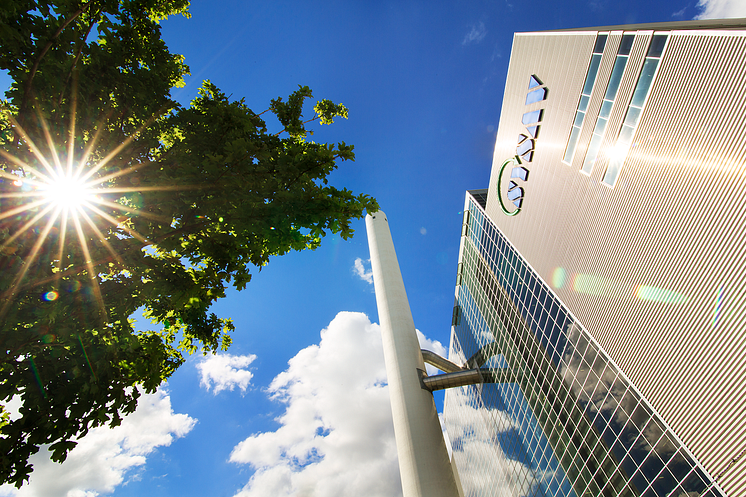

Pressmeddelande
A feasibility study on CCS shows two promising technologies for carbon capture.
25 APR, 2022 10:20
Sysav is exploring the conditions for a major investment in carbon capture technology at its waste-to-energy plant in Malmö. An overarching feasibility study highlights two technically mature technologies deemed suitable for Sysav to continue investigating. The implementation of CCS could reduce carbon dioxide emissions by around 90 percent.
With the goal of becoming climate positive by 2030, Sysav is examining the potential for introducing CCS (Carbon Capture and Storage). Supported by the Swedish Energy Agency’s Industriklivet climate initiative, a comprehensive feasibility study has been carried out. The purpose was to identify the most advantageous CCS technology and to evaluate the economic and legal conditions, including transport and storage. The study also assessed land requirements, estimated investment costs, and total cost per ton of captured CO₂.
Evaluation of Technology
When selecting a capture technology, factors such as energy consumption, technical performance, and commercial availability are compared. Two technically mature technologies were chosen for in-depth analysis. Both are based on chemical absorption and show similar performance. One uses an amine-based process with monoethanolamine (MEA) in aqueous solution, while the other uses potassium carbonate in aqueous solution (HPC = Hot Potassium Carbonate). Both technologies, however, have high energy demands. Research and development are ongoing to identify more energy-efficient capture methods, and Sysav is participating in such a pilot project in collaboration with Lund University and other partners. This project is also co-funded by Industriklivet.
“Through this comprehensive feasibility study, we’ve significantly raised our knowledge level about CCS and made progress in clarifying the questions that need to be answered before a decision on implementation can be made. We’ve also initiated several valuable collaborations to help make CCS a reality in the region and in Sweden. We’re very pleased with the expert support we’ve received from Ramboll Denmark in strengthening our competence. Furthermore, the financial support from Industriklivet has been crucial to this work, and we appreciate the Swedish Energy Agency’s efficient handling of the funding program. We now look forward to taking the next step,” says Magnus Pettersson, CEO of Sysav Utveckling.
“Studies like this are important first steps toward future implementation of bio-CCS. This means that, in the long run, we can not only reduce our emissions but also achieve negative emissions in Sweden,” says Isabella Gustafsson Ismodes, Research Officer at the Swedish Energy Agency.
Next Steps
The work is now continuing into a more detailed phase, with further studies of the technology and its integration into the plant. Sysav has also helped establish a cluster of actors in southern Sweden to jointly examine how the captured CO₂ can be transported for storage. In addition, a strategic study will address the economic, legal, and permitting conditions needed to prepare for an implementation decision. If the conditions are favorable, an implementation project could lead to full-scale CO₂ capture at Sysav’s waste-to-energy plant around 2030, followed by transport and storage.
Impact
The combustion of residual waste at Sysav’s combined heat and power plant currently generates about 600,000 tons of carbon dioxide emissions annually. Around 40 percent comes from fossil sources—mainly plastics—and about 60 percent from biogenic sources such as paper and food waste. With a potential full-scale implementation of CCS, approximately 90 percent of these emissions could be captured and stored.
What Does “Climate Positive” Mean?
Being climate positive means having a climate footprint from direct emissions that is below net zero. Sweden as a nation aims to achieve net-zero emissions by 2045, while Sysav’s ambition is to reach this goal 15 years earlier. Sysav also aims to contribute significantly to emission reductions in the region. Beyond achieving net-zero emissions from its operations, Sysav intends to act as a carbon sink for the region. Read more about Sysav’s climate initiatives in the company’s Sustainability Report.
About CCS
CCS (Carbon Capture and Storage) involves capturing carbon dioxide and converting it into liquid form using pressure and low temperature. It can then be safely stored underground or beneath the seabed, thereby reducing greenhouse gas emissions to the atmosphere.
About Industriklivet
Industriklivet provides support for developing solutions to reduce process-related industrial emissions and for technologies that enable negative emissions. Through strategically important initiatives, Industriklivet supports the application of new technologies and innovative solutions within industry that contribute to a fossil-free society.
Senast uppdaterad 2025-10-30 09:21